北师版(2019)选择性必修第一册UNIT 1 Relationships TOPIC TALK & LESSON 1课件(共89张PPT)
文档属性
| 名称 | 北师版(2019)选择性必修第一册UNIT 1 Relationships TOPIC TALK & LESSON 1课件(共89张PPT) |

|
|
| 格式 | pptx | ||
| 文件大小 | 1.8MB | ||
| 资源类型 | 教案 | ||
| 版本资源 | 北师大版(2019) | ||
| 科目 | 英语 | ||
| 更新时间 | 2023-11-06 11:28:18 | ||
图片预览


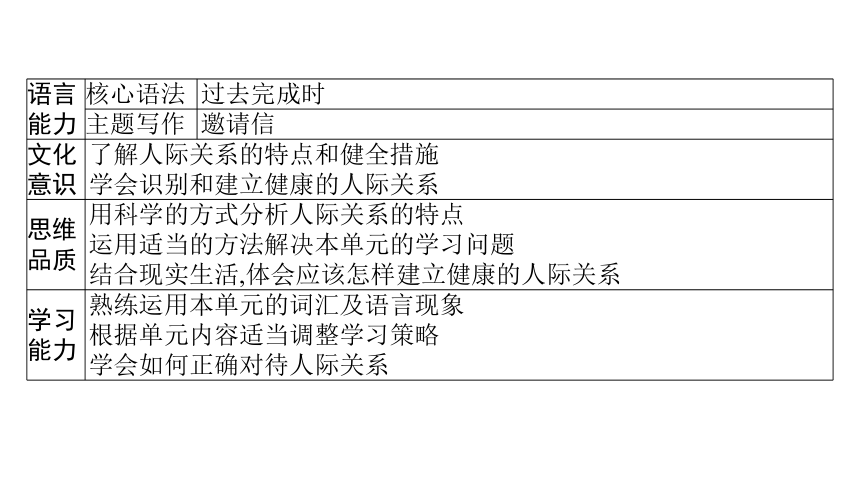
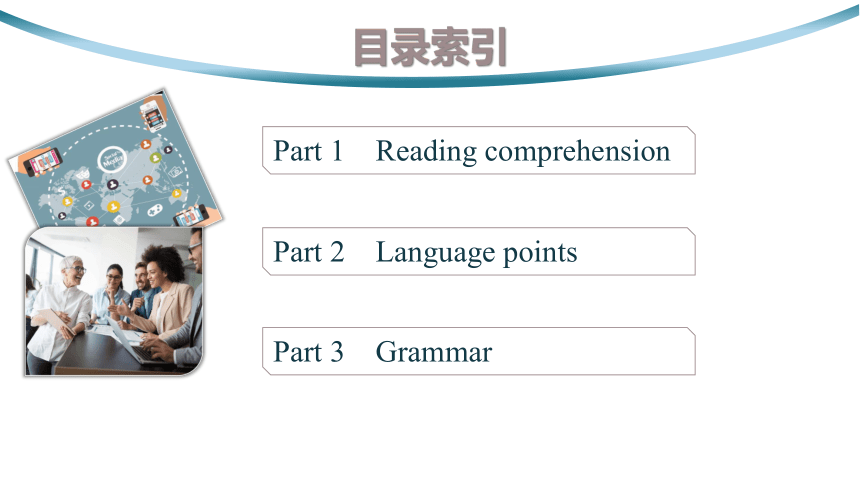

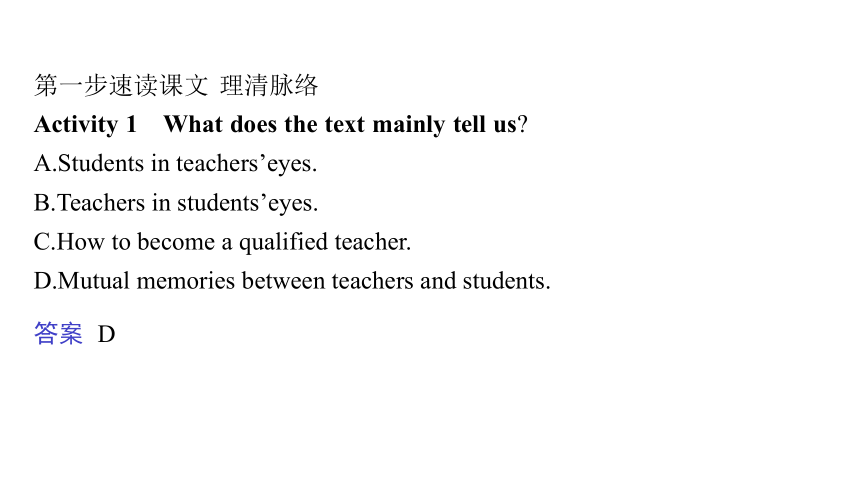
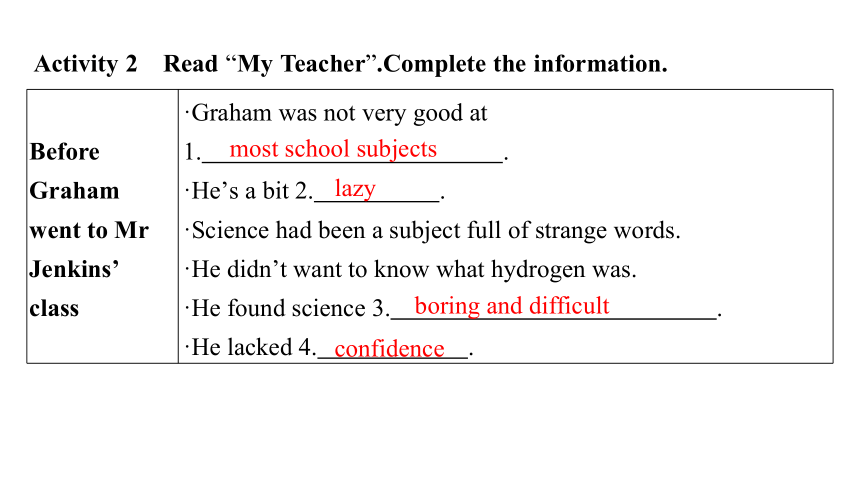
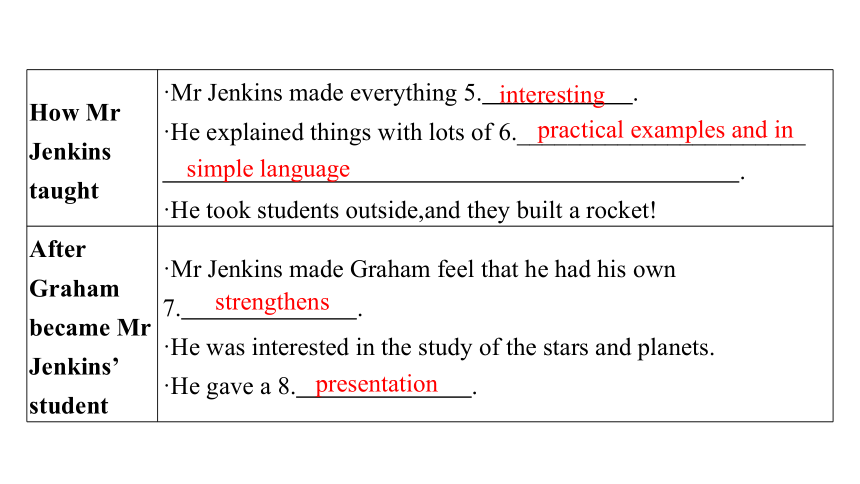

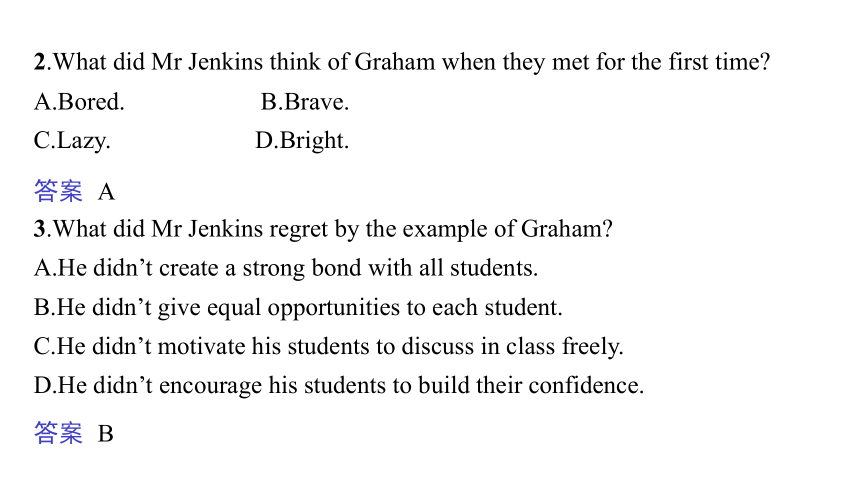
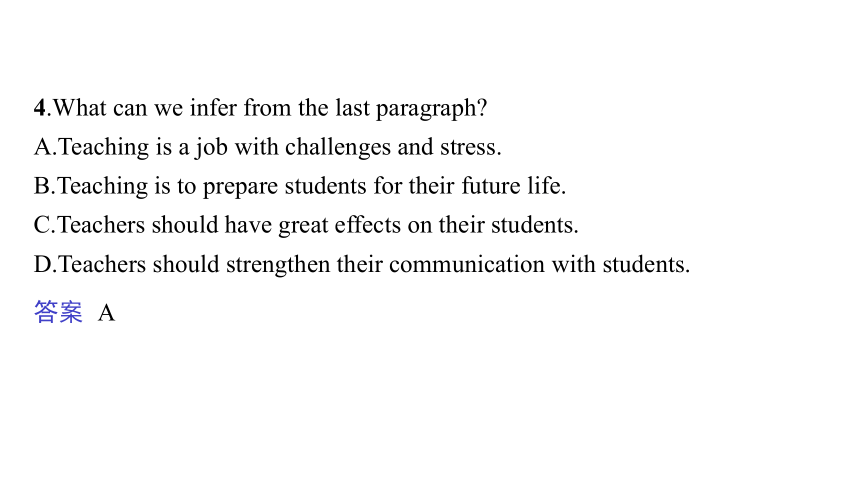

文档简介
(共89张PPT)
UNIT 1 RELATIONSHIPS
Section A TOPIC TALK & LESSON 1
素养导航 明目标
语言 能力 必背 单词
重点 短语
humour outgoing host occasionally extremely
grateful practical lack drag access
worthwhile handle preference upset ashamed
intention demanding raise manner sensitive
flow reserved reality desperate delay
bend complain appointment organise
competitor engagement approval defend
for the first time pour into a couple of used to
associate with obsess over chatter away
on behalf of sb take up in contrast to
语言 能力 核心语法 过去完成时
主题写作 邀请信
文化 意识 了解人际关系的特点和健全措施 学会识别和建立健康的人际关系
思维 品质 用科学的方式分析人际关系的特点 运用适当的方法解决本单元的学习问题 结合现实生活,体会应该怎样建立健康的人际关系
学习 能力 熟练运用本单元的词汇及语言现象 根据单元内容适当调整学习策略 学会如何正确对待人际关系
Part 1 Reading comprehension
Part 2 Language points
目录索引
Part 3 Grammar
Part 1 Reading comprehension
第一步速读课文 理清脉络
Activity 1 What does the text mainly tell us
A.Students in teachers’eyes.
B.Teachers in students’eyes.
C.How to become a qualified teacher.
D.Mutual memories between teachers and students.
答案 D
Activity 2 Read “My plete the information.
Before Graham went to Mr Jenkins’ class ·Graham was not very good at
1. .
·He’s a bit 2. .
·Science had been a subject full of strange words.
·He didn’t want to know what hydrogen was.
·He found science 3. .
·He lacked 4. .
most school subjects
lazy
boring and difficult
confidence
How Mr Jenkins taught ·Mr Jenkins made everything 5. .
·He explained things with lots of 6._______________________
.
·He took students outside,and they built a rocket!
After Graham became Mr Jenkins’ student ·Mr Jenkins made Graham feel that he had his own
7. .
·He was interested in the study of the stars and planets.
·He gave a 8. .
interesting
practical examples and in
simple language
strengthens
presentation
第二步精读课文 领悟细节
Activity 3 阅读文章,选出最佳选项。
1.What can we know about Mr Jenkins
A.He was an excellent English teacher.
B.He was a bad teacher with a bit lazy.
C.He would explain hard things with practical examples.
D.He would force students to give presentations to the class.
答案 C
2.What did Mr Jenkins think of Graham when they met for the first time
A.Bored. B.Brave.
C.Lazy. D.Bright.
3.What did Mr Jenkins regret by the example of Graham
A.He didn’t create a strong bond with all students.
B.He didn’t give equal opportunities to each student.
C.He didn’t motivate his students to discuss in class freely.
D.He didn’t encourage his students to build their confidence.
答案 A
答案 B
4.What can we infer from the last paragraph
A.Teaching is a job with challenges and stress.
B.Teaching is to prepare students for their future life.
C.Teachers should have great effects on their students.
D.Teachers should strengthen their communication with students.
答案 A
Activity 4 思考分享 提升思维
1.What was the impression of your teacher in high school
2.What are your teacher’s beliefs in teaching
The answer is open.
The answer is open.
Activity 5 诵读佳句 学练写作
1.Read the passage carefully and find the sentence(s) describing Brian Jenkins.
2.Read the passage carefully and find the sentence(s) describing Graham Lawrence.
He used to explain things which seemed difficult with lots of practical examples and in simple language.
He was very bright and he had done very well in science subjects.
第三步深读课文 融会提能
Activity 6 课文语篇填空
When I read one of Graham’s books and see him on TV,I am proud of him.I used 1. (teach) him!I remember Graham was very difficult
2. I taught him.But he changed 3. (quick) after I set up 4. experiment to show how the human stomach works
5. (use) acid and an onion.He was very bright but lacked
6. (confident) in himself.With my encouragement,he had done very well in science subjects.How I wish I 7. (do) as well with all my students as I have with Graham.Teaching is a 8. (stress)
to teach
before
quickly
an
using
confidence
had done
stressful
job but I love what I do.As a teacher I can help turn a child like Graham
9. a successful adult,and I know what I’m doing is worthwhile.
Education is not preparation for life;education is life 10. (it).
into
itself
Activity 7 长难句分析
1.The only thing I can remember from school maths is that the angles of a triangle add up to 180 degrees!
[句式分析]
The only thing I can remember from school maths is that the angles of a triangle add up to 180 degrees!
省略that的定语从句
引导表语从句
[尝试翻译]
我唯一还记得的数学课内容是三角形的内角和是180度。
2.He used to explain things which seemed difficult with lots of practical examples and in simple language.
[句式分析]
He used to explain things which seemed difficult with lots of practical examples and in simple language.
引导定语从句
[尝试翻译]
他过去常常用大量的实例和简单的语言来解释看似困难的事情。
Part 2 Language points
基础落实 必备知识全过关
重点单词
必记写作词汇
1. adj.外向的,好交际的
2. vt.主办;做……的东道主
n.主人;主持人
3. adj.极好的;难以置信的
4. adj.感激的,感谢的
5. adj.实际的;实践的;切实可行的
6. vt.灌,注,倒
outgoing
host
incredible
grateful
practical
pour
7. vt.缺乏
8. n.行为,举止
9. vt.拖,拉
10. n.进入;接触的机会
11. adj.值得做的;重要的;有益的
lack
behaviour
drag
access
worthwhile
识记阅读词汇
1.trait n.
2.niece n.
3.nephew n.
4.secondary adj.
5.flu n.
6.angle n.
7.triangle n.
8.hydrogen n.
特性,品质
侄女,外甥女
侄子,外甥
中等教育的;中级的;次要的
流行性感冒,流感
角
三角形
氢
9.rocket n.
10.fuel n.
11.presentation n.
12.acid n.
13.onion n.
14.educationalist n.
火箭
燃料
报告;陈述,说明
酸
洋葱
教育(学)家
串记拓展词汇
1. n.幽默感→ adj.幽默的→ adv.幽默地
2. adj.热爱的,酷爱的;具有强烈信念的→ adv.非常地,极度地;热情地
3. adv.偶尔;偶然→ n.场合,时机→ adj.偶然的
4. adj.情感上的;激起感情的→ n.情绪,强烈的情感→ adv.在情绪上
5. adv.极度,极其→ adj.极度的,极其的,极端的 n.极端
humour
humorous
humorously
passionate
passionately
occasionally
occasion
occasional
emotional
emotion
emotionally
extremely
extreme
【掌握构词规律 快速记牢单词】
-ly多数构成同义副词,少数构成形容词表示“……的”,如:
occasional→occasionally 偶然地
extreme→extremely 尤其;极端地
polite→politely 礼貌地
quick→quickly 迅速地
heavy→heavily 沉重地
friend→friendly (adj.) 友好的
love→lovely (adj.)可爱的
重点短语
1.for the first time
2.pour into
3.a couple of
4. 过去经常,曾经
5. 总计;达到
6. 点燃
7. 建立
8. 准许进入
初次,第一次
投入(倒)……于某物
一些,几个;一双,一对
used to
add up to
set off
set up
have access to
要点探究 能力素养全提升
、
基础词汇——语境记忆
1.grateful adj.感激的,感谢的
【佳句背诵】We would be grateful for any information you can give us.[感谢信]
我们将非常感激你提供的任何信息。
2.drag vt.拖,拉
【佳句背诵】We dragged the fallen tree clear of the road.[活动安排]
我们把倒下的树从路上拖走。
.、
高频词汇——讲练互动
1.humour n.幽默感;幽默;诙谐;脾气;情绪
(1)a sense of humour 幽默感
in a good/bad humour 心情好/坏
out of humour 心情不好
(2)humorous adj.幽默的;滑稽的
【佳句背诵】Studies show that a good sense of humour even makes you seem smarter.[人际交往]
研究表明,良好的幽默感甚至会让你看起来更聪明。
【即学即练】单句语法填空/单句写作
(1)Dad is always in good humour for gardening.
(2)我心情不太好。
I was a little ________ _________ _________ .
(3)他很有幽默感。
He has ________ _________ _________ _________ _________.
a
out of humour
a good sense of humour
2.occasionally adv.偶尔;偶然
(1)occasion n.场合;时机
on occasion 有时,偶尔
if the occasion arises (=if the occasion should arise)必要的时候
on one occasion 曾经,有一次
on several occasions 屡次,好几次
take/seize the occasion to do... 抓住时机做……,乘机做……
(2)occasional adj.偶尔的
【佳句背诵】Husband and wife should switch roles with each other occasionally.[家庭生活]
夫妻应该偶尔互换角色。
【词语辨析】occasion,situation,condition与case
(1)occasion指特定的“时机,场合”;situation往往指“情况,形势”;condition指某时某处事情发展、存在的状况、状态或条件;case常指事物的特定情况、事情的真相和始末,如“病例,案件”等。如:
All the people involved in this case must be present.
所有与这起案件相关的人都必须到场。
The current international situation is not optimistic.
目前的国际形势不容乐观。
Living conditions have improved here over the past few years.
这里的生活条件在过去几年已得到改善。
It is not very suitable to sing such a song on this formal occasion.
在这种正式场合唱这样一首歌是不太合适的。
(2)occasion后面的定语从句多由when或on which引导;situation,case后面的定语从句多由where或in which引导。如:
There are occasions when/on which one must give in.
任何人都有不得不让步的时候。
Sometimes you are in a situation where everything goes against your favour.
有时你会遇到什么都不顺的情况。
【即学即练】单句语法填空/单句写作
(1)Don’t worry.There is no harm in your staying up late _____________ (occasion).
(2)Occasions are quite rare I have the time to spend a day with my kids.
(3)A good many cases are mentioned in the book good communication skills contribute to one’s chances of success.
(4)It’s helpful to put children in a situation they can see themselves differently.
occasionally
when
where
where
(5)他抓住机会邀请她到家里吃晚饭。
He _____________ _________ _________ _________ _________ her home for dinner.
(6)有时他去伦敦过周末。
he went to London to spend the weekend.
seized/took the occasion to invite
On occasion
3.add up to 合计达,总计达
add to 使增强,使增加,使扩大
add up 把……加起来,相加; 合乎情理,有道理
add...to... 把……加到……里
add that... 补充说……
【佳句背诵】How much does the bill add up to [家庭生活]
账单加起来一共是多少
【即学即练】单句语法填空/单句写作
(1)He wrote down the weight of each stone and then added all the weight.
(2)这栋楼房已经经历过多次扩建。
The building_________ ___________ __________ ______time after time.
(3)她在牛奶里加了糖。
She sugar her milk.
up
has been added to
added
to
(4)如果我们把这些费用加起来,总数超过了500英镑。
If we these expenses ,the total comes to over £500.
(5)这次旅行的费用总计达5 000元。
The travelling cost of this time ________ _________ _________ 5,000 yuan.
(6)我想补充一句,我们对结果感到满意。
I ________ _________ _________ _________that we are pleased with the result.
add
up
added up to
would like to add
4.for the first time 初次,第一次
in time 迟早;最后;及时
on time 准时
all the time 一直,始终
at one time 曾经,一度
at a time 每次,逐一
from time to time 有时,偶尔
in no time 立刻,马上
at times 有时
【佳句背诵】He has got full marks in the English exam for the first time.[学校生活]
他第一次在英语考试中得满分。
【名师点津】in time后可接for sth/to do sth 的形式,意为“及时/来得及做某事”。
【即学即练】用time的相关短语填空/一句多译
(1)If you keep on,you’ll succeed .
(2) ,half the land on the earth’s surface was covered by the forest.
(3) ,I failed in an English exam,though English had been my favourite.
in time
At one time
For the first time
(4)他第二次在物理考试中得满分。
→_________________________________ that he full marks in the physics exam.
→It is the second time him full marks in the physics exam.
→He has got full marks in the physics exam _______________________ .
It/This/That is the second time
has got
for
to get
for the second time
5.used to 过去经常,曾经
be/get/become used to... 习惯于……
be/get accustomed to 习惯于
be used to do sth 被用来做某事
be used as...被用作……
【佳句背诵】When I was a kid,my siblings and I used to have ice cream for dessert.[家庭生活]
在我孩提时,我和我的兄弟姐妹经常吃冰激凌当甜点。
【词语辨析】used to,be/get/become used to,be/get accustomed to,be used to do sth
(1)used to“过去常常”,指的是过去的习惯性动作,目的在于与现在形成对照。其中to是不定式符号,后面跟动词原形。
(2)be/get/become used to“习惯于”,to是介词,后跟名词、代词或动词-ing形式作宾语。be used to表示状态,而get/become used to则表示由“不习惯”到“习惯于”的过程,意思是“(变得)习惯于,开始习惯于”。
(3)be/get accustomed to也可表示“习惯于”,其中to是介词,后接名词、代词或动词-ing形式等作宾语。
(4)be used to do sth“被用来做某事”,实际上是动词use的被动语态,to是不定式符号。
【即学即练】单句语法填空/单句写作
(1)Some people are really not used to (use) credit cards.
(2)他过去常常在网上玩游戏,但是现在他已经戒掉了这个习惯,全身心地投入到学习中去了。
He ________ _________ _________ games on the Internet,but now he has given up the addiction and put his heart into studies.
(3)我已经变得习惯于在喧闹而刺激的房间里工作。
I’ve ____________ _________ _________ working in the room of noise and excitement.
using
used to play
ot/become used to
(4)互联网应是用来获取有用信息的。
The Internet ________ _________ _________ _________ _________ useful information.
(5)——过去在这条街的尽头有一家书店,是吧
——是的。几年前它被拆掉了。
—There used to be a bookstore at the end of the street,
—Yes.It was pulled down several years ago.
should be used to get
didn’t there
6.practical adj.实际的;实践的;切实可行的
(1)for (all) practical purposes 实际上,事实上
(2)practise v.练习,训练
practice v.练习,训练
n.练习,习惯,惯例;实践
practise/practice doing sth 练习做某事
(3)impractical adj.不切实际的;不实用的
【佳句背诵】It’s an interesting idea,but there are many practical difficulties.[个人观点]
这是一个很有意思的想法,然而却存在着许多实际困难。
【即学即练】单句语法填空/单句写作
(1)The sale was supposed to last for a week,but all practical purposes it’s over.
(2)To be a good football player,you need to practise (play) football every day.
(3)It’s common practice to exchange gifts with friends and relatives at Christmas.
(4)Many people spoke highly of the plan at the meeting,but personally,I don’t think it is of much (practice) use.
for
playing
a
practical
(5)理论是以实践为基础的,反过来又为实践服务。
Theory is based on practice and ________ _________ _________ ________.
(6)摆脱过时且不实用的陈旧的传统观念对我们来说是重要的。
It is important for us to break away from the old traditional ideas which are out of date .
in turn serves practice
and impractical
7.pour v.灌,注,倒;倾泻;不断流动;蜂拥而来
pour down 向下倾注;流下
pour in 大量地涌进来;倒入,使涌入
pour into 投入(倒)……于某物;不断地或大量地流进或涌进
pour out 倒出;倾诉;倾吐
【佳句背诵】After that I poured oil into a pan and turned on the stove.[家庭生活]
然后我把油倒进锅里,打开炉子。
【即学即练】单句语法填空/单句写作
(1)We listened to him pour his troubles.
(2)Letters of complaint continue to pour .
(3)Thousands of people poured the stadium to watch the football match.
(4)他很着急,汗水沿着他的脸直淌下来。
He was so worried that sweat began to ________ _________ _________ _________.
out
in
into
pour down his
face
(5)祝贺信从全国各地源源不断地涌来。
Letters of congratulations from all parts of the country.
(6)她慢慢地把水从壶里倒进瓶里。
She slowly ________ _________ _________ the bottle from the kettle.
(7)一到家,他喜欢先为自己倒点酒。
He would like to ________ _________ _________ _________for himself the moment he got home.
poured in
poured water into
pour out some wine
8.lack v.缺乏,不足 n.缺乏;无
lack of sth缺乏某物
lack for sth 需要某物
lack for nothing 一无所缺
be lacking in 缺乏(品质、特点等)
for lack of 因缺乏
have no lack of 不缺乏
be short of 缺少
【佳句背诵】Lack of talent and time is no reason for taking no action.[学习生活]
缺乏天赋和时间并不是不采取行动的理由。
【即学即练】单句语法填空/单句写作
(1)Later,he worked in Africa,where many people suffered from blindness
lack of proper treatment.
(2)我们没有力气继续前行,于是就躺在地上睡一会儿。
As we the strength to go any farther,we lay on the ground to have a sleep.
(3)缺少雨水导致了严重的粮食短缺。
________ _________ _________ led to the serious lack of food.
for
lacked
The lack of rain
(4)工程因资金匮乏只得被放弃。
The project had to be given up ________ _________ _________ money.
(5)这姑娘好像完全没有勇气跟老板说不。
The girl seems to be entirely courage to say no to the boss.
(6)毕业后他申请了一份又一份工作,但都因为缺乏经验而被拒绝。
He applied for job after job after graduation,but was always rejected
________ _________ _________ previous experience.
for lack of
short of/lacking in
for lack of
9.access n.进入;接触的机会,通道 v.进入
(1)access to... 进入……的通道
give access to接见; 准许进入
have/gain/get/obtain access to...有/获得……方法
(2)accessible adj.可接近的;可进入的;可使用的
be accessible to sb 某人可接近/可进入/可使用
【佳句背诵】People in that mountain area had no access to education.[学校生活]
那个山区的人们过去没有受教育的机会。
【词语辨析】sb have/has access to sth与sth be accessible to sb常可互换。如:
Books in our school library are accessible to students as well as teachers.
=Students as well as teachers have access to books in our school library.
老师和学生都有权使用我们学校图书馆里的书籍。
The full facts of the case are accessible to only a few people.
=Only a few people have access to the full facts of the case.
只有少数几个人能获得有关该案全部事实的材料。
【即学即练】单句语法填空/单句写作
(1)The only access the building is across the road.
(2)药品不应放在儿童容易拿到的地方。
Medicine should not be kept where it ________ _________ _________ children.
(3)由于下雪,乡下的许多地方我们都去不了。
Because of the snow,many parts of the countryside are no longer
__________ _________ us.
to
is accessible to
accessible to
(4)只有沿着那条狭窄的路走才能到达他们的房子。
________ _________ _________ their house is along that narrow road.
(5)通向成功的方法是好好利用受教育的机会。
The access is to make good use of the access to education.
(6)最近开发了一种新的软件,能让盲人使用因特网。
A new piece of software has recently been developed,making the Internet
the blind.
The only access to
to success
accessible to
10.worthwhile adj.值得做的;重要的;有益的
(1)it is worthwhile to do/doing sth 值得做某事
(2)worth adj.值得的
be worth doing sth 值得做某事
(3)worthy adj.值得的
be worthy of... 值得……
be worthy to be done/of being done 值得被做
【佳句背诵】Thank you for making my visit so worthwhile.[感谢信]
感谢你们使我的访问如此值得。
【词语辨析】worthwhile,worth与worthy
(1)worthwhile表“值得做的”,基本句式是it is worthwhile doing/to do sth。如:
It is worthwhile searching for his roots.
有必要查查他的底细。
(2)worth强调“某事值得做或表示物品的价值”,基本句式是sth be worth sth或sth be worth doing。如:
The necklace is worth 500 francs at most.
这条项链最多值500法郎。
The novel is worth reading a second time.
这部小说值得再读一遍。
(3)worthy强调“应该得到(尊重、信任、表彰等)”,不表示价值。基本句式是be worthy of sth,be worthy to be done或be worthy of being done。如:
His courage is worthy of high praise.
他的勇气值得高度赞扬。
(4)有时,相同的意思可以用以上三个词组成不同的表达。如:
The place of interest is worth a visit.
=The place of interest is worth visiting.
=The place of interest is worthy to be visited.
=The place of interest is worthy of a visit.
=The place of interest is worthy of being visited.
=It is worthwhile visiting the place of interest.
这处名胜值得参观。
【即学即练】单句语法填空/单句写作
(1) is really worthwhile to study the animals in Corbett.
(2)你提的建议值得考虑。
The suggestion you have put forward is worthy of _______________ / .
(3)我在评论中回复了他,但我觉得这值得向我们所有的读者提及。
I answered him in a comment,but I think ________ _________ _________ to all of our readers.
It
consideration
being considered
it’s worth mentioning
(4)那座教堂是那些古老壮观的英国建筑物之一,值得去参观。
The church was one of those fine old English structures worthy
____________________________________________ .
(5)我认为花这么多时间来讨论这件事不值得。
I don’t think it to devote so much time to discussing the matter.
of a visit/to be visited/of being visited
worthwhile
、
多义词汇——自主练透
Ⅰ.一词多义
fuel
A.n.燃料;刺激性言行
B.v.给(某物)加燃料;供给(某物)燃料;给汽车加汽油;加强;刺激
①His comments are bound to add fuel to the debate.
②Delays were caused by the discovery of dangerous fuel leaks.
③Coal is one of the cheapest fuels.
④The economic boom was fuelled by easy credit.
A
A
A
B
Ⅱ.教材熟词生义
presentation
项目 意义 例句
熟义 n. I’m going to ask each of you to make a short presentation.
生义 n. They are preparing for the presentation of a new musical.
报告;陈述,说明
演出
、
重点句式——多维剖析
if only... 要是……就好了;只要
【教材原句】Sometimes I think,if only I could call him and ask for his opinion!
有时我想,要是我能打电话问问他的意见就好了!
(1)if only引导的条件句,通常用来表示说话人对某事所寄予的某种强烈愿望。它可以独立使用,用来表示由于客观条件限制,为某事不大可能或完全不可能实现而感到惋惜或遗憾的复杂心情,常用虚拟语气。表示与过去事实相反:从句用过去完成时had done/had been;表示与现在事实相反:从句用过去时did/were;表示与将来事实相反:从句用could/would/might/should do结构。
If only I were a Goodwill Ambassador!
要是我是一个亲善大使就好了!
If only I had taken your advice!
我要是接受你的建议就好了!
If only I should come to your party tomorrow evening!
明天晚上要是我能来参加你的聚会就好了!
(2)only if引导的条件状语从句,是一个对“条件”限制更严的“限制性条件状语从句”,表示“只有……(才);只有在……的时候,唯一的条件是……”;与if引导的一般条件句相比,它有一种增强主句语势的作用。
I wake up only if the alarm clock rings.
只有闹钟响了,我才会醒。
【佳句背诵】If only he’d remembered to buy some fruit.[人物介绍]
他当时要是记得买些水果来该多好。
【即学即练】用only if/ if only完成句子
(1)He will succeed he does his best.
(2) the case is urgent should you call the doctor in the middle of the night.
(3) I were as clever as you!
(4) you had not told Tom what I said,everything would have been all right.
only if
Only if
If only
If only
Part 3 Grammar
语法冲关 语言规则全理清
情景导入
过去完成时
Oprah Winfery is a talk show hostess,actress and television producer.Thanks to her talent and great effort,she had become a millionaire by the time she was 32.By 2000,with a net worth of $800 million,Oprah had been regarded as the richest African American of the 20th century.Oprah said it was her grandmother who had encouraged her to speak in the public.Although successful in work,she used to have a weight problem.But she hadn’t given up.Surprisingly,she had lost almost 90 pounds through dieting and exercising.
【语法感悟】
过去完成时是由 构成的;其否定形式是 ;
其被动语态是 。
had done
hadn’t/had not done
had been done
语法精讲
一、概念: 表示过去的过去,其构成是had +过去分词
1.肯定句:主语+had+过去分词
2.否定句:主语+had+not+过去分词
3.一般疑问句:Had+主语+过去分词
肯定回答:Yes,主语+had.
否定回答:No,主语+had not.
4.特殊疑问句:特殊疑问词或词组+一般疑问句(had+主语+过去分词)
二、用法
1.表示某一动作在过去某一时刻之前已完成。
He had gone to bed by 10:00 last night.
昨晚十点钟之前他已上床睡觉了。
2.与一般过去时搭配,表达某一动作在过去的动作发生时已完成。
The train had started when I got to the station.
当我到达车站时火车已开走了。
3.表示从过去某一时间开始一直延续到过去另一时间的动作或状态。常与for (后跟时间段)或since (后跟时间点)等连用。
She had worked in this school since it opened 25 years ago.
自从二十五年前这所学校开办以来,她一直在这里工作。
4.使用过去完成时在简单句里表达某一动作在过去的某一时刻已完成时,该过去的时刻常以“by +过去时间”的短语来表达。
例如下面的说法是不正确的:
He had gone to bed at 10:00 last night.
若是要说“at 10:00 last night”就必须用一般过去时“He went to bed...”。 试比较下面的句子:
It had rained yesterday.(误)
It rained yesterday.(正)
【即学即练】单句语法填空
(1)By nine o’clock last night,we (get) 200 pictures from the spaceship.
(2)I thought I (send) the letter a week before.
(3)I returned the book that I (borrow) from the library.
had got
had sent
had borrowed
三、过去完成时常见句型
过去完成时既可表示过去某个时间或动作之前所发生的事情,也可表示过去某个时间或动作之前所发生的动作一直持续到过去某个时间,下面是过去完成时的常见句型:
1.“By the end of +名词(短语),主语 + had done...”
By the end of the day,most of the inhabitants had left their homes.
到这一天结束,大部分居民已离开了他们的家。
2.用在told,said,knew,heard,thought等动词后的宾语从句中,表示动作发生在这些动词之前。
She said that she had never been to Paris.
她说她从未去过巴黎。
3.“By the time + 从句(did/was/were),主语 + had done...”
By the time we arrived,everyone had received medical care.
我们到达时,每个人已接受了医疗护理。
4.“主语 +had done...,before 从句(did/was/were)”
Fortunately,the people had left the village before the volcano erupted.
幸运的是,火山喷发前人们已离开了村庄。
5.“主语 +had done...,when 从句(did/was/were)”
They had already put the fire out when I returned to the village.
当我返回村子时,他们已将大火扑灭。
6.“主语 + (did/was/were),after 从句(had done)”
The earthquake happened in the daytime,after people had already left home for work or school.
地震发生在白天,当时人们已离开家去上班或上学。
7.用在“Hardly(Scarcely/Barely)...when...或No sooner...than...”句型中
Hardly had I got home when the rain poured down.
我刚到家大雨就倾盆而下。
No sooner had he left home than it began to rain.
他一离开家天就开始下起雨来。
8.用在“It /This/That was the first...time + that 从句(had done)”中
It was the third time that he had made the same mistake.
这是他第三次犯同样的错误了。
9.用在“It was/had been + 一段时间 + since 从句(had done)”中
It was ten years since we had had such a wonderful time.
我们已经有十年都没这么高兴了。
10.hope,plan,mean,expect,intend,suppose,want,think 等动词有时用过去完成时表示一个本来打算做而未做或曾经设想而未实现的事
They had wanted to help but could not get here in time.
他们本来想帮忙,但未及时赶到这儿。
I had intended to come over to see you,but was prevented from doing so.
我原打算过来看你,但受阻未成。
11.用于表示与过去事实相反的if 虚拟条件句中
If she had seen you yesterday,she would have told you the truth.
如果她昨天见过你,她早就告诉你事实的真相了。
12.用在 wish 后的宾语从句中,表示与过去事实相反
I wished that he hadn’t made such a mistake.
我希望他从未犯过这样的错误。
【即学即练】单句语法填空
(1)I (learn) 900 English words by the time I was ten.
(2)She (live) here for a few years before she moved to Beijing.
(3)By the time my parents reached home yesterday,I (cook) the dinner already.
had learned
had lived
had cooked
四、过去完成时与其他时态的区别
过去完成时有特殊的语法规则,它与其他时态有明显不同,不仅结构上不同,内容、含义上也不同。
1.过去完成时与现在完成时的区别
现在完成时表示的动作发生在过去,以现在的时间为基点,侧重对现在产生的结果或造成的影响,与现在有关,其结构为“助动词have (has) + 过去分词”;过去完成时则是一个相对的时态,以过去时间为基点,它所表示的动作不仅发生在过去,更强调“过去的过去”,只有和过去某时或某动作相比较时,才用到它。
比较:I have learned 1,000 English words so far.
到目前为止我已经学了1 000 个英语单词。
I had learned 1,000 English words till then.
到那时为止我已经学了1 000 个英语单词。
2.过去完成时与一般过去时的区别
虽然这两种时态都表示过去发生的动作或存在的状态,但在使用时应注意以下几点:
(1)时间状语不同:过去完成时在时间上强调“过去的过去”;而一般过去时只强调过去某一特定的时间。
比较:They had arrived at the station by ten yesterday.他们昨天十点就到了车站。
They arrived at the station at ten yesterday.
他们昨天十点到达车站。
(2)在没有明确的过去时间状语作标志时,谓语动词动作发生的时间先后须依据上下文来判断:先发生的用过去完成时,后发生的则用一般过去时。
She was very happy.Her whole family were pleased with her,too.She had just won first prize in the composition competition.
她非常高兴。她的全家也对她很满意。她刚在作文比赛中获得一等奖。
(3)当两个或两个以上接连发生的动作用and 或but 连接时,按时间顺序,只需用一般过去时来代替过去完成时;另外,在before、after、as soon as 引导的从句中,由于这些连接词本身已经表示出时间的先后,因此也可以用过去时来代替过去完成时。
He entered the room,turned on the light and read an evening paper.
他走进房间,打开灯,读了一份晚报。
【即学即练】单句语法填空
(1)She didn’t go to bed until she (finish) her work.
(2)When I (wake) up,it (stop) raining already.
(3)After he (arrive) in England,Marx (work) hard to improve his English.
finished
woke
had stopped
arrived
worked
本 课 结 束
UNIT 1 RELATIONSHIPS
Section A TOPIC TALK & LESSON 1
素养导航 明目标
语言 能力 必背 单词
重点 短语
humour outgoing host occasionally extremely
grateful practical lack drag access
worthwhile handle preference upset ashamed
intention demanding raise manner sensitive
flow reserved reality desperate delay
bend complain appointment organise
competitor engagement approval defend
for the first time pour into a couple of used to
associate with obsess over chatter away
on behalf of sb take up in contrast to
语言 能力 核心语法 过去完成时
主题写作 邀请信
文化 意识 了解人际关系的特点和健全措施 学会识别和建立健康的人际关系
思维 品质 用科学的方式分析人际关系的特点 运用适当的方法解决本单元的学习问题 结合现实生活,体会应该怎样建立健康的人际关系
学习 能力 熟练运用本单元的词汇及语言现象 根据单元内容适当调整学习策略 学会如何正确对待人际关系
Part 1 Reading comprehension
Part 2 Language points
目录索引
Part 3 Grammar
Part 1 Reading comprehension
第一步速读课文 理清脉络
Activity 1 What does the text mainly tell us
A.Students in teachers’eyes.
B.Teachers in students’eyes.
C.How to become a qualified teacher.
D.Mutual memories between teachers and students.
答案 D
Activity 2 Read “My plete the information.
Before Graham went to Mr Jenkins’ class ·Graham was not very good at
1. .
·He’s a bit 2. .
·Science had been a subject full of strange words.
·He didn’t want to know what hydrogen was.
·He found science 3. .
·He lacked 4. .
most school subjects
lazy
boring and difficult
confidence
How Mr Jenkins taught ·Mr Jenkins made everything 5. .
·He explained things with lots of 6._______________________
.
·He took students outside,and they built a rocket!
After Graham became Mr Jenkins’ student ·Mr Jenkins made Graham feel that he had his own
7. .
·He was interested in the study of the stars and planets.
·He gave a 8. .
interesting
practical examples and in
simple language
strengthens
presentation
第二步精读课文 领悟细节
Activity 3 阅读文章,选出最佳选项。
1.What can we know about Mr Jenkins
A.He was an excellent English teacher.
B.He was a bad teacher with a bit lazy.
C.He would explain hard things with practical examples.
D.He would force students to give presentations to the class.
答案 C
2.What did Mr Jenkins think of Graham when they met for the first time
A.Bored. B.Brave.
C.Lazy. D.Bright.
3.What did Mr Jenkins regret by the example of Graham
A.He didn’t create a strong bond with all students.
B.He didn’t give equal opportunities to each student.
C.He didn’t motivate his students to discuss in class freely.
D.He didn’t encourage his students to build their confidence.
答案 A
答案 B
4.What can we infer from the last paragraph
A.Teaching is a job with challenges and stress.
B.Teaching is to prepare students for their future life.
C.Teachers should have great effects on their students.
D.Teachers should strengthen their communication with students.
答案 A
Activity 4 思考分享 提升思维
1.What was the impression of your teacher in high school
2.What are your teacher’s beliefs in teaching
The answer is open.
The answer is open.
Activity 5 诵读佳句 学练写作
1.Read the passage carefully and find the sentence(s) describing Brian Jenkins.
2.Read the passage carefully and find the sentence(s) describing Graham Lawrence.
He used to explain things which seemed difficult with lots of practical examples and in simple language.
He was very bright and he had done very well in science subjects.
第三步深读课文 融会提能
Activity 6 课文语篇填空
When I read one of Graham’s books and see him on TV,I am proud of him.I used 1. (teach) him!I remember Graham was very difficult
2. I taught him.But he changed 3. (quick) after I set up 4. experiment to show how the human stomach works
5. (use) acid and an onion.He was very bright but lacked
6. (confident) in himself.With my encouragement,he had done very well in science subjects.How I wish I 7. (do) as well with all my students as I have with Graham.Teaching is a 8. (stress)
to teach
before
quickly
an
using
confidence
had done
stressful
job but I love what I do.As a teacher I can help turn a child like Graham
9. a successful adult,and I know what I’m doing is worthwhile.
Education is not preparation for life;education is life 10. (it).
into
itself
Activity 7 长难句分析
1.The only thing I can remember from school maths is that the angles of a triangle add up to 180 degrees!
[句式分析]
The only thing I can remember from school maths is that the angles of a triangle add up to 180 degrees!
省略that的定语从句
引导表语从句
[尝试翻译]
我唯一还记得的数学课内容是三角形的内角和是180度。
2.He used to explain things which seemed difficult with lots of practical examples and in simple language.
[句式分析]
He used to explain things which seemed difficult with lots of practical examples and in simple language.
引导定语从句
[尝试翻译]
他过去常常用大量的实例和简单的语言来解释看似困难的事情。
Part 2 Language points
基础落实 必备知识全过关
重点单词
必记写作词汇
1. adj.外向的,好交际的
2. vt.主办;做……的东道主
n.主人;主持人
3. adj.极好的;难以置信的
4. adj.感激的,感谢的
5. adj.实际的;实践的;切实可行的
6. vt.灌,注,倒
outgoing
host
incredible
grateful
practical
pour
7. vt.缺乏
8. n.行为,举止
9. vt.拖,拉
10. n.进入;接触的机会
11. adj.值得做的;重要的;有益的
lack
behaviour
drag
access
worthwhile
识记阅读词汇
1.trait n.
2.niece n.
3.nephew n.
4.secondary adj.
5.flu n.
6.angle n.
7.triangle n.
8.hydrogen n.
特性,品质
侄女,外甥女
侄子,外甥
中等教育的;中级的;次要的
流行性感冒,流感
角
三角形
氢
9.rocket n.
10.fuel n.
11.presentation n.
12.acid n.
13.onion n.
14.educationalist n.
火箭
燃料
报告;陈述,说明
酸
洋葱
教育(学)家
串记拓展词汇
1. n.幽默感→ adj.幽默的→ adv.幽默地
2. adj.热爱的,酷爱的;具有强烈信念的→ adv.非常地,极度地;热情地
3. adv.偶尔;偶然→ n.场合,时机→ adj.偶然的
4. adj.情感上的;激起感情的→ n.情绪,强烈的情感→ adv.在情绪上
5. adv.极度,极其→ adj.极度的,极其的,极端的 n.极端
humour
humorous
humorously
passionate
passionately
occasionally
occasion
occasional
emotional
emotion
emotionally
extremely
extreme
【掌握构词规律 快速记牢单词】
-ly多数构成同义副词,少数构成形容词表示“……的”,如:
occasional→occasionally 偶然地
extreme→extremely 尤其;极端地
polite→politely 礼貌地
quick→quickly 迅速地
heavy→heavily 沉重地
friend→friendly (adj.) 友好的
love→lovely (adj.)可爱的
重点短语
1.for the first time
2.pour into
3.a couple of
4. 过去经常,曾经
5. 总计;达到
6. 点燃
7. 建立
8. 准许进入
初次,第一次
投入(倒)……于某物
一些,几个;一双,一对
used to
add up to
set off
set up
have access to
要点探究 能力素养全提升
、
基础词汇——语境记忆
1.grateful adj.感激的,感谢的
【佳句背诵】We would be grateful for any information you can give us.[感谢信]
我们将非常感激你提供的任何信息。
2.drag vt.拖,拉
【佳句背诵】We dragged the fallen tree clear of the road.[活动安排]
我们把倒下的树从路上拖走。
.、
高频词汇——讲练互动
1.humour n.幽默感;幽默;诙谐;脾气;情绪
(1)a sense of humour 幽默感
in a good/bad humour 心情好/坏
out of humour 心情不好
(2)humorous adj.幽默的;滑稽的
【佳句背诵】Studies show that a good sense of humour even makes you seem smarter.[人际交往]
研究表明,良好的幽默感甚至会让你看起来更聪明。
【即学即练】单句语法填空/单句写作
(1)Dad is always in good humour for gardening.
(2)我心情不太好。
I was a little ________ _________ _________ .
(3)他很有幽默感。
He has ________ _________ _________ _________ _________.
a
out of humour
a good sense of humour
2.occasionally adv.偶尔;偶然
(1)occasion n.场合;时机
on occasion 有时,偶尔
if the occasion arises (=if the occasion should arise)必要的时候
on one occasion 曾经,有一次
on several occasions 屡次,好几次
take/seize the occasion to do... 抓住时机做……,乘机做……
(2)occasional adj.偶尔的
【佳句背诵】Husband and wife should switch roles with each other occasionally.[家庭生活]
夫妻应该偶尔互换角色。
【词语辨析】occasion,situation,condition与case
(1)occasion指特定的“时机,场合”;situation往往指“情况,形势”;condition指某时某处事情发展、存在的状况、状态或条件;case常指事物的特定情况、事情的真相和始末,如“病例,案件”等。如:
All the people involved in this case must be present.
所有与这起案件相关的人都必须到场。
The current international situation is not optimistic.
目前的国际形势不容乐观。
Living conditions have improved here over the past few years.
这里的生活条件在过去几年已得到改善。
It is not very suitable to sing such a song on this formal occasion.
在这种正式场合唱这样一首歌是不太合适的。
(2)occasion后面的定语从句多由when或on which引导;situation,case后面的定语从句多由where或in which引导。如:
There are occasions when/on which one must give in.
任何人都有不得不让步的时候。
Sometimes you are in a situation where everything goes against your favour.
有时你会遇到什么都不顺的情况。
【即学即练】单句语法填空/单句写作
(1)Don’t worry.There is no harm in your staying up late _____________ (occasion).
(2)Occasions are quite rare I have the time to spend a day with my kids.
(3)A good many cases are mentioned in the book good communication skills contribute to one’s chances of success.
(4)It’s helpful to put children in a situation they can see themselves differently.
occasionally
when
where
where
(5)他抓住机会邀请她到家里吃晚饭。
He _____________ _________ _________ _________ _________ her home for dinner.
(6)有时他去伦敦过周末。
he went to London to spend the weekend.
seized/took the occasion to invite
On occasion
3.add up to 合计达,总计达
add to 使增强,使增加,使扩大
add up 把……加起来,相加; 合乎情理,有道理
add...to... 把……加到……里
add that... 补充说……
【佳句背诵】How much does the bill add up to [家庭生活]
账单加起来一共是多少
【即学即练】单句语法填空/单句写作
(1)He wrote down the weight of each stone and then added all the weight.
(2)这栋楼房已经经历过多次扩建。
The building_________ ___________ __________ ______time after time.
(3)她在牛奶里加了糖。
She sugar her milk.
up
has been added to
added
to
(4)如果我们把这些费用加起来,总数超过了500英镑。
If we these expenses ,the total comes to over £500.
(5)这次旅行的费用总计达5 000元。
The travelling cost of this time ________ _________ _________ 5,000 yuan.
(6)我想补充一句,我们对结果感到满意。
I ________ _________ _________ _________that we are pleased with the result.
add
up
added up to
would like to add
4.for the first time 初次,第一次
in time 迟早;最后;及时
on time 准时
all the time 一直,始终
at one time 曾经,一度
at a time 每次,逐一
from time to time 有时,偶尔
in no time 立刻,马上
at times 有时
【佳句背诵】He has got full marks in the English exam for the first time.[学校生活]
他第一次在英语考试中得满分。
【名师点津】in time后可接for sth/to do sth 的形式,意为“及时/来得及做某事”。
【即学即练】用time的相关短语填空/一句多译
(1)If you keep on,you’ll succeed .
(2) ,half the land on the earth’s surface was covered by the forest.
(3) ,I failed in an English exam,though English had been my favourite.
in time
At one time
For the first time
(4)他第二次在物理考试中得满分。
→_________________________________ that he full marks in the physics exam.
→It is the second time him full marks in the physics exam.
→He has got full marks in the physics exam _______________________ .
It/This/That is the second time
has got
for
to get
for the second time
5.used to 过去经常,曾经
be/get/become used to... 习惯于……
be/get accustomed to 习惯于
be used to do sth 被用来做某事
be used as...被用作……
【佳句背诵】When I was a kid,my siblings and I used to have ice cream for dessert.[家庭生活]
在我孩提时,我和我的兄弟姐妹经常吃冰激凌当甜点。
【词语辨析】used to,be/get/become used to,be/get accustomed to,be used to do sth
(1)used to“过去常常”,指的是过去的习惯性动作,目的在于与现在形成对照。其中to是不定式符号,后面跟动词原形。
(2)be/get/become used to“习惯于”,to是介词,后跟名词、代词或动词-ing形式作宾语。be used to表示状态,而get/become used to则表示由“不习惯”到“习惯于”的过程,意思是“(变得)习惯于,开始习惯于”。
(3)be/get accustomed to也可表示“习惯于”,其中to是介词,后接名词、代词或动词-ing形式等作宾语。
(4)be used to do sth“被用来做某事”,实际上是动词use的被动语态,to是不定式符号。
【即学即练】单句语法填空/单句写作
(1)Some people are really not used to (use) credit cards.
(2)他过去常常在网上玩游戏,但是现在他已经戒掉了这个习惯,全身心地投入到学习中去了。
He ________ _________ _________ games on the Internet,but now he has given up the addiction and put his heart into studies.
(3)我已经变得习惯于在喧闹而刺激的房间里工作。
I’ve ____________ _________ _________ working in the room of noise and excitement.
using
used to play
ot/become used to
(4)互联网应是用来获取有用信息的。
The Internet ________ _________ _________ _________ _________ useful information.
(5)——过去在这条街的尽头有一家书店,是吧
——是的。几年前它被拆掉了。
—There used to be a bookstore at the end of the street,
—Yes.It was pulled down several years ago.
should be used to get
didn’t there
6.practical adj.实际的;实践的;切实可行的
(1)for (all) practical purposes 实际上,事实上
(2)practise v.练习,训练
practice v.练习,训练
n.练习,习惯,惯例;实践
practise/practice doing sth 练习做某事
(3)impractical adj.不切实际的;不实用的
【佳句背诵】It’s an interesting idea,but there are many practical difficulties.[个人观点]
这是一个很有意思的想法,然而却存在着许多实际困难。
【即学即练】单句语法填空/单句写作
(1)The sale was supposed to last for a week,but all practical purposes it’s over.
(2)To be a good football player,you need to practise (play) football every day.
(3)It’s common practice to exchange gifts with friends and relatives at Christmas.
(4)Many people spoke highly of the plan at the meeting,but personally,I don’t think it is of much (practice) use.
for
playing
a
practical
(5)理论是以实践为基础的,反过来又为实践服务。
Theory is based on practice and ________ _________ _________ ________.
(6)摆脱过时且不实用的陈旧的传统观念对我们来说是重要的。
It is important for us to break away from the old traditional ideas which are out of date .
in turn serves practice
and impractical
7.pour v.灌,注,倒;倾泻;不断流动;蜂拥而来
pour down 向下倾注;流下
pour in 大量地涌进来;倒入,使涌入
pour into 投入(倒)……于某物;不断地或大量地流进或涌进
pour out 倒出;倾诉;倾吐
【佳句背诵】After that I poured oil into a pan and turned on the stove.[家庭生活]
然后我把油倒进锅里,打开炉子。
【即学即练】单句语法填空/单句写作
(1)We listened to him pour his troubles.
(2)Letters of complaint continue to pour .
(3)Thousands of people poured the stadium to watch the football match.
(4)他很着急,汗水沿着他的脸直淌下来。
He was so worried that sweat began to ________ _________ _________ _________.
out
in
into
pour down his
face
(5)祝贺信从全国各地源源不断地涌来。
Letters of congratulations from all parts of the country.
(6)她慢慢地把水从壶里倒进瓶里。
She slowly ________ _________ _________ the bottle from the kettle.
(7)一到家,他喜欢先为自己倒点酒。
He would like to ________ _________ _________ _________for himself the moment he got home.
poured in
poured water into
pour out some wine
8.lack v.缺乏,不足 n.缺乏;无
lack of sth缺乏某物
lack for sth 需要某物
lack for nothing 一无所缺
be lacking in 缺乏(品质、特点等)
for lack of 因缺乏
have no lack of 不缺乏
be short of 缺少
【佳句背诵】Lack of talent and time is no reason for taking no action.[学习生活]
缺乏天赋和时间并不是不采取行动的理由。
【即学即练】单句语法填空/单句写作
(1)Later,he worked in Africa,where many people suffered from blindness
lack of proper treatment.
(2)我们没有力气继续前行,于是就躺在地上睡一会儿。
As we the strength to go any farther,we lay on the ground to have a sleep.
(3)缺少雨水导致了严重的粮食短缺。
________ _________ _________ led to the serious lack of food.
for
lacked
The lack of rain
(4)工程因资金匮乏只得被放弃。
The project had to be given up ________ _________ _________ money.
(5)这姑娘好像完全没有勇气跟老板说不。
The girl seems to be entirely courage to say no to the boss.
(6)毕业后他申请了一份又一份工作,但都因为缺乏经验而被拒绝。
He applied for job after job after graduation,but was always rejected
________ _________ _________ previous experience.
for lack of
short of/lacking in
for lack of
9.access n.进入;接触的机会,通道 v.进入
(1)access to... 进入……的通道
give access to接见; 准许进入
have/gain/get/obtain access to...有/获得……方法
(2)accessible adj.可接近的;可进入的;可使用的
be accessible to sb 某人可接近/可进入/可使用
【佳句背诵】People in that mountain area had no access to education.[学校生活]
那个山区的人们过去没有受教育的机会。
【词语辨析】sb have/has access to sth与sth be accessible to sb常可互换。如:
Books in our school library are accessible to students as well as teachers.
=Students as well as teachers have access to books in our school library.
老师和学生都有权使用我们学校图书馆里的书籍。
The full facts of the case are accessible to only a few people.
=Only a few people have access to the full facts of the case.
只有少数几个人能获得有关该案全部事实的材料。
【即学即练】单句语法填空/单句写作
(1)The only access the building is across the road.
(2)药品不应放在儿童容易拿到的地方。
Medicine should not be kept where it ________ _________ _________ children.
(3)由于下雪,乡下的许多地方我们都去不了。
Because of the snow,many parts of the countryside are no longer
__________ _________ us.
to
is accessible to
accessible to
(4)只有沿着那条狭窄的路走才能到达他们的房子。
________ _________ _________ their house is along that narrow road.
(5)通向成功的方法是好好利用受教育的机会。
The access is to make good use of the access to education.
(6)最近开发了一种新的软件,能让盲人使用因特网。
A new piece of software has recently been developed,making the Internet
the blind.
The only access to
to success
accessible to
10.worthwhile adj.值得做的;重要的;有益的
(1)it is worthwhile to do/doing sth 值得做某事
(2)worth adj.值得的
be worth doing sth 值得做某事
(3)worthy adj.值得的
be worthy of... 值得……
be worthy to be done/of being done 值得被做
【佳句背诵】Thank you for making my visit so worthwhile.[感谢信]
感谢你们使我的访问如此值得。
【词语辨析】worthwhile,worth与worthy
(1)worthwhile表“值得做的”,基本句式是it is worthwhile doing/to do sth。如:
It is worthwhile searching for his roots.
有必要查查他的底细。
(2)worth强调“某事值得做或表示物品的价值”,基本句式是sth be worth sth或sth be worth doing。如:
The necklace is worth 500 francs at most.
这条项链最多值500法郎。
The novel is worth reading a second time.
这部小说值得再读一遍。
(3)worthy强调“应该得到(尊重、信任、表彰等)”,不表示价值。基本句式是be worthy of sth,be worthy to be done或be worthy of being done。如:
His courage is worthy of high praise.
他的勇气值得高度赞扬。
(4)有时,相同的意思可以用以上三个词组成不同的表达。如:
The place of interest is worth a visit.
=The place of interest is worth visiting.
=The place of interest is worthy to be visited.
=The place of interest is worthy of a visit.
=The place of interest is worthy of being visited.
=It is worthwhile visiting the place of interest.
这处名胜值得参观。
【即学即练】单句语法填空/单句写作
(1) is really worthwhile to study the animals in Corbett.
(2)你提的建议值得考虑。
The suggestion you have put forward is worthy of _______________ / .
(3)我在评论中回复了他,但我觉得这值得向我们所有的读者提及。
I answered him in a comment,but I think ________ _________ _________ to all of our readers.
It
consideration
being considered
it’s worth mentioning
(4)那座教堂是那些古老壮观的英国建筑物之一,值得去参观。
The church was one of those fine old English structures worthy
____________________________________________ .
(5)我认为花这么多时间来讨论这件事不值得。
I don’t think it to devote so much time to discussing the matter.
of a visit/to be visited/of being visited
worthwhile
、
多义词汇——自主练透
Ⅰ.一词多义
fuel
A.n.燃料;刺激性言行
B.v.给(某物)加燃料;供给(某物)燃料;给汽车加汽油;加强;刺激
①His comments are bound to add fuel to the debate.
②Delays were caused by the discovery of dangerous fuel leaks.
③Coal is one of the cheapest fuels.
④The economic boom was fuelled by easy credit.
A
A
A
B
Ⅱ.教材熟词生义
presentation
项目 意义 例句
熟义 n. I’m going to ask each of you to make a short presentation.
生义 n. They are preparing for the presentation of a new musical.
报告;陈述,说明
演出
、
重点句式——多维剖析
if only... 要是……就好了;只要
【教材原句】Sometimes I think,if only I could call him and ask for his opinion!
有时我想,要是我能打电话问问他的意见就好了!
(1)if only引导的条件句,通常用来表示说话人对某事所寄予的某种强烈愿望。它可以独立使用,用来表示由于客观条件限制,为某事不大可能或完全不可能实现而感到惋惜或遗憾的复杂心情,常用虚拟语气。表示与过去事实相反:从句用过去完成时had done/had been;表示与现在事实相反:从句用过去时did/were;表示与将来事实相反:从句用could/would/might/should do结构。
If only I were a Goodwill Ambassador!
要是我是一个亲善大使就好了!
If only I had taken your advice!
我要是接受你的建议就好了!
If only I should come to your party tomorrow evening!
明天晚上要是我能来参加你的聚会就好了!
(2)only if引导的条件状语从句,是一个对“条件”限制更严的“限制性条件状语从句”,表示“只有……(才);只有在……的时候,唯一的条件是……”;与if引导的一般条件句相比,它有一种增强主句语势的作用。
I wake up only if the alarm clock rings.
只有闹钟响了,我才会醒。
【佳句背诵】If only he’d remembered to buy some fruit.[人物介绍]
他当时要是记得买些水果来该多好。
【即学即练】用only if/ if only完成句子
(1)He will succeed he does his best.
(2) the case is urgent should you call the doctor in the middle of the night.
(3) I were as clever as you!
(4) you had not told Tom what I said,everything would have been all right.
only if
Only if
If only
If only
Part 3 Grammar
语法冲关 语言规则全理清
情景导入
过去完成时
Oprah Winfery is a talk show hostess,actress and television producer.Thanks to her talent and great effort,she had become a millionaire by the time she was 32.By 2000,with a net worth of $800 million,Oprah had been regarded as the richest African American of the 20th century.Oprah said it was her grandmother who had encouraged her to speak in the public.Although successful in work,she used to have a weight problem.But she hadn’t given up.Surprisingly,she had lost almost 90 pounds through dieting and exercising.
【语法感悟】
过去完成时是由 构成的;其否定形式是 ;
其被动语态是 。
had done
hadn’t/had not done
had been done
语法精讲
一、概念: 表示过去的过去,其构成是had +过去分词
1.肯定句:主语+had+过去分词
2.否定句:主语+had+not+过去分词
3.一般疑问句:Had+主语+过去分词
肯定回答:Yes,主语+had.
否定回答:No,主语+had not.
4.特殊疑问句:特殊疑问词或词组+一般疑问句(had+主语+过去分词)
二、用法
1.表示某一动作在过去某一时刻之前已完成。
He had gone to bed by 10:00 last night.
昨晚十点钟之前他已上床睡觉了。
2.与一般过去时搭配,表达某一动作在过去的动作发生时已完成。
The train had started when I got to the station.
当我到达车站时火车已开走了。
3.表示从过去某一时间开始一直延续到过去另一时间的动作或状态。常与for (后跟时间段)或since (后跟时间点)等连用。
She had worked in this school since it opened 25 years ago.
自从二十五年前这所学校开办以来,她一直在这里工作。
4.使用过去完成时在简单句里表达某一动作在过去的某一时刻已完成时,该过去的时刻常以“by +过去时间”的短语来表达。
例如下面的说法是不正确的:
He had gone to bed at 10:00 last night.
若是要说“at 10:00 last night”就必须用一般过去时“He went to bed...”。 试比较下面的句子:
It had rained yesterday.(误)
It rained yesterday.(正)
【即学即练】单句语法填空
(1)By nine o’clock last night,we (get) 200 pictures from the spaceship.
(2)I thought I (send) the letter a week before.
(3)I returned the book that I (borrow) from the library.
had got
had sent
had borrowed
三、过去完成时常见句型
过去完成时既可表示过去某个时间或动作之前所发生的事情,也可表示过去某个时间或动作之前所发生的动作一直持续到过去某个时间,下面是过去完成时的常见句型:
1.“By the end of +名词(短语),主语 + had done...”
By the end of the day,most of the inhabitants had left their homes.
到这一天结束,大部分居民已离开了他们的家。
2.用在told,said,knew,heard,thought等动词后的宾语从句中,表示动作发生在这些动词之前。
She said that she had never been to Paris.
她说她从未去过巴黎。
3.“By the time + 从句(did/was/were),主语 + had done...”
By the time we arrived,everyone had received medical care.
我们到达时,每个人已接受了医疗护理。
4.“主语 +had done...,before 从句(did/was/were)”
Fortunately,the people had left the village before the volcano erupted.
幸运的是,火山喷发前人们已离开了村庄。
5.“主语 +had done...,when 从句(did/was/were)”
They had already put the fire out when I returned to the village.
当我返回村子时,他们已将大火扑灭。
6.“主语 + (did/was/were),after 从句(had done)”
The earthquake happened in the daytime,after people had already left home for work or school.
地震发生在白天,当时人们已离开家去上班或上学。
7.用在“Hardly(Scarcely/Barely)...when...或No sooner...than...”句型中
Hardly had I got home when the rain poured down.
我刚到家大雨就倾盆而下。
No sooner had he left home than it began to rain.
他一离开家天就开始下起雨来。
8.用在“It /This/That was the first...time + that 从句(had done)”中
It was the third time that he had made the same mistake.
这是他第三次犯同样的错误了。
9.用在“It was/had been + 一段时间 + since 从句(had done)”中
It was ten years since we had had such a wonderful time.
我们已经有十年都没这么高兴了。
10.hope,plan,mean,expect,intend,suppose,want,think 等动词有时用过去完成时表示一个本来打算做而未做或曾经设想而未实现的事
They had wanted to help but could not get here in time.
他们本来想帮忙,但未及时赶到这儿。
I had intended to come over to see you,but was prevented from doing so.
我原打算过来看你,但受阻未成。
11.用于表示与过去事实相反的if 虚拟条件句中
If she had seen you yesterday,she would have told you the truth.
如果她昨天见过你,她早就告诉你事实的真相了。
12.用在 wish 后的宾语从句中,表示与过去事实相反
I wished that he hadn’t made such a mistake.
我希望他从未犯过这样的错误。
【即学即练】单句语法填空
(1)I (learn) 900 English words by the time I was ten.
(2)She (live) here for a few years before she moved to Beijing.
(3)By the time my parents reached home yesterday,I (cook) the dinner already.
had learned
had lived
had cooked
四、过去完成时与其他时态的区别
过去完成时有特殊的语法规则,它与其他时态有明显不同,不仅结构上不同,内容、含义上也不同。
1.过去完成时与现在完成时的区别
现在完成时表示的动作发生在过去,以现在的时间为基点,侧重对现在产生的结果或造成的影响,与现在有关,其结构为“助动词have (has) + 过去分词”;过去完成时则是一个相对的时态,以过去时间为基点,它所表示的动作不仅发生在过去,更强调“过去的过去”,只有和过去某时或某动作相比较时,才用到它。
比较:I have learned 1,000 English words so far.
到目前为止我已经学了1 000 个英语单词。
I had learned 1,000 English words till then.
到那时为止我已经学了1 000 个英语单词。
2.过去完成时与一般过去时的区别
虽然这两种时态都表示过去发生的动作或存在的状态,但在使用时应注意以下几点:
(1)时间状语不同:过去完成时在时间上强调“过去的过去”;而一般过去时只强调过去某一特定的时间。
比较:They had arrived at the station by ten yesterday.他们昨天十点就到了车站。
They arrived at the station at ten yesterday.
他们昨天十点到达车站。
(2)在没有明确的过去时间状语作标志时,谓语动词动作发生的时间先后须依据上下文来判断:先发生的用过去完成时,后发生的则用一般过去时。
She was very happy.Her whole family were pleased with her,too.She had just won first prize in the composition competition.
她非常高兴。她的全家也对她很满意。她刚在作文比赛中获得一等奖。
(3)当两个或两个以上接连发生的动作用and 或but 连接时,按时间顺序,只需用一般过去时来代替过去完成时;另外,在before、after、as soon as 引导的从句中,由于这些连接词本身已经表示出时间的先后,因此也可以用过去时来代替过去完成时。
He entered the room,turned on the light and read an evening paper.
他走进房间,打开灯,读了一份晚报。
【即学即练】单句语法填空
(1)She didn’t go to bed until she (finish) her work.
(2)When I (wake) up,it (stop) raining already.
(3)After he (arrive) in England,Marx (work) hard to improve his English.
finished
woke
had stopped
arrived
worked
本 课 结 束
同课章节目录
- Unit 1 Relationshis
- Lesson 1 Teachers
- Lesson 2 How Do We Like Teachers’ Feedback?
- Lesson 3 So Close,Yet So Fa
- Unit 2 Success
- Lesson 1 Money vs Success
- Lesson 2 Top Five Secrets of Success
- Lesson 3 Getting to the Top
- Unit 3 Conservation
- Lesson 1 The Sixth Extinction
- Lesson 2 War on Plastic Packets
- Lesson 3 The Road to Destruction
